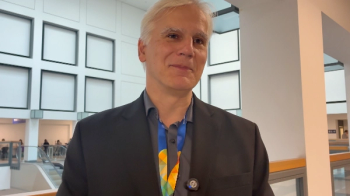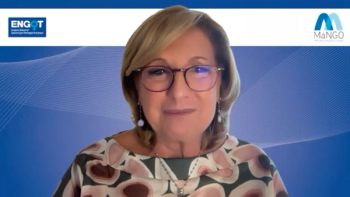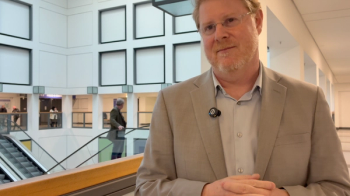
Erika Hamilton, MD, reports early trial data showing DB-1305/BNT325, a TROP2-targeted ADC, produced encouraging responses in heavily pretreated TNBC patients.

Erika Hamilton, MD, reports early trial data showing DB-1305/BNT325, a TROP2-targeted ADC, produced encouraging responses in heavily pretreated TNBC patients.

A new TROP2-targeted ADC showed promising efficacy in an early TNBC trial, with Erika Hamilton, MD, highlighting its potential for broader use in future treatment.

Explore the future of cancer treatment with tumor-agnostic therapies, as experts unveil promising trials and innovative drug developments at ESMO.

A study reveals promising results for combining enfortumab vedotin and pembrolizumab in treating recurrent head and neck cancer, showing a 39% response rate.

IO Biotech's immune-modulatory cancer vaccine combination shows promise in advanced melanoma, despite missing statistical significance for PFS.

Perioperative enfortumab vedotin plus pembrolizumab demonstrated significant results in a population that represents roughly half of all patients with MIBC, explained Christof Vulsteke, MD, PhD.

Balazs Halmos, MD, of Montefiore Albert Einstein Cancer Center, discussed the potential impact of subcutaneous amivantamab EGFR-mutated NSCLC.

New findings reveal that combining Pluvicto with standard therapies significantly improves outcomes for patients with prostate cancer, enhancing quality of life.

Experts at the European Society for Medical Oncology Congress meeting in Berlin, Germany, explore rising cancer rates in young adults, focusing on survivorship challenges and the role of lifestyle interventions in care.

A mini oral session at ESMO of targeted therapy in non-small cell lung cancer included treatments that showed effectiveness in brain metastases.

Rebecca Dent, MD, MSc, of the National Cancer Center in Singapore, gives insights on the use of antibody-drug conjugates (ADCs) in early breast cancer treatment.

New KEYNOTE-B96 data add to previous results showing progression-free survival (PFS) and overall survival (OS) improvements vs placebo.

Stephen Freedland, MD, of Cedars-Sinai, discussed enzalutamide and leuprolide's potential to improve overall survival without sacrificing quality of life in prostate cancer.

Experts at ESMO Congress highlighted the urgent need for open discussions on sexual health post cancer treatment, emphasizing its impact on quality of life.

Combination therapy with enfortumab vedotin and pembrolizumab significantly reduces progression and mortality risk of muscle invasive bladder cancer in first-line treatment.

Adjuvant abemaciclib (Verzenio; Eli Lilly) plus endocrine therapy prolonged survival in high-risk HR-positive, HER2-negative early-stage breast cancer.

Results presented at ESMO show zongertinib produced 79% PFS at 6 months and nearly half of patients remained on treatment at the data cutoff. Investigators reported strong efficacy and tolerability in first-line treatment of advanced HER2-mutant NSCLC.

ESMO Congress 2025 in Berlin showcases breakthroughs in precision medicine for bladder, breast, lung, and prostate cancers, enhancing patient quality of life.

Vivek Subbiah, MD, highlights key topics at the 50th European Society for Medical Oncology (ESMO) Congress, including the rise of tumor-agnostic therapies and the use of artificial intelligence (AI) in cancer care.

The phase 2 PICCOLO trial demonstrated that mirvetuximab soravtansine (Elahere; AbbVie) is effective and tolerable in heavily pre-treated patients with folate receptor alpha-positive (FRα+), platinum-sensitive ovarian cancer.

Multiple sessions at ESMO Congress 2024 covered antibody-drug conjugates (ADCs), which are an emerging therapy that holds great promise in cancer but comes with challenges.

The phase 1/2 SAINT study is currently investigating intravenous trabectedin plus ipilimumab and nivolumab in the first line for advanced soft tissue sarcoma.

The first overall survival analysis of the KEYNOTE-522 trial showed positive outcomes with neoadjuvant pembrolizumab plus chemotherapy followed by adjuvant pembrolizumab monotherapy vs neoadjuvant chemotherapy alone in high-risk early-stage triple-negative breast cancer (TNBC).

Nicolas Girard, MD, head of the Curie-Montsouris Thorax Institute, discusses patient-reported outcomes (PROs) from the phase 2 LUMINOSITY trial of telisotuzumab vedotin (Teliso-V) in non–small cell lung cancer (NSCLC).

The evolving landscape of artificial intelligence (AI) use in cancer care requires evaluation of algorithms before implementation and continual monitoring after, explained Amy Abernethy, MD, cofounder of Highlander Health and former FDA official.

At ESMO Congress 2024, Shuji Ogino, MD, PhD, MS, explained that the rising incidence of young-onset cancer may be due to generational risk factors such as lifestyle, diet, and environmental changes, emphasizing the need for long-term research and follow up to understand early-life influences on cancer development.

Lowered costs and incremental effectiveness could improve when using biomarker-guided selection for treatment of patients with metastatic colorectal cancer using first-line nivolumab.

Clinical research presented at the European Society for Medical Oncology Congress 2024 highlights the significant survival benefits of perioperative and neoadjuvant immunotherapy with nivolumab and nivolumab plus ipilimumab, while emphasizing the role of biomarkers, such as circulating tumor DNA and KRAS mutations, in guiding treatment decisions.

Mirvetuximab soravtansine showed high evidence of efficacy in heavily pretreated FRα-positive, platinum-sensitive ovarian cancer, which is a challenging patient population to treat, Angeles Alvarez Secord, MD, MHSc, gynecologic oncologist at Duke Health, said.

While neoadjuvant therapy in stage III or greater melanoma is already the standard of care, new research presented at European Society of Medical Oncology (ESMO) Congress 2024 shows that what therapy is used is important for outcomes.

259 Prospect Plains Rd, Bldg H
Cranbury, NJ 08512
© 2025 MJH Life Sciences®
All rights reserved.
